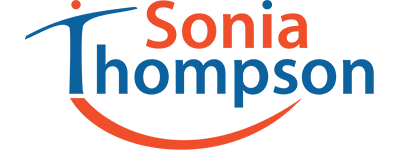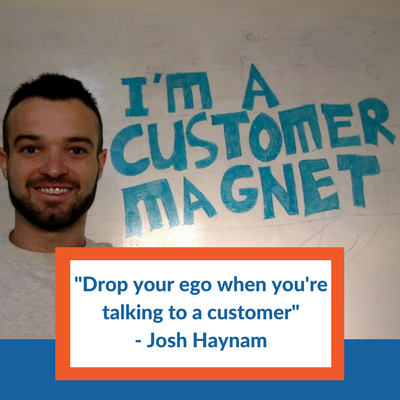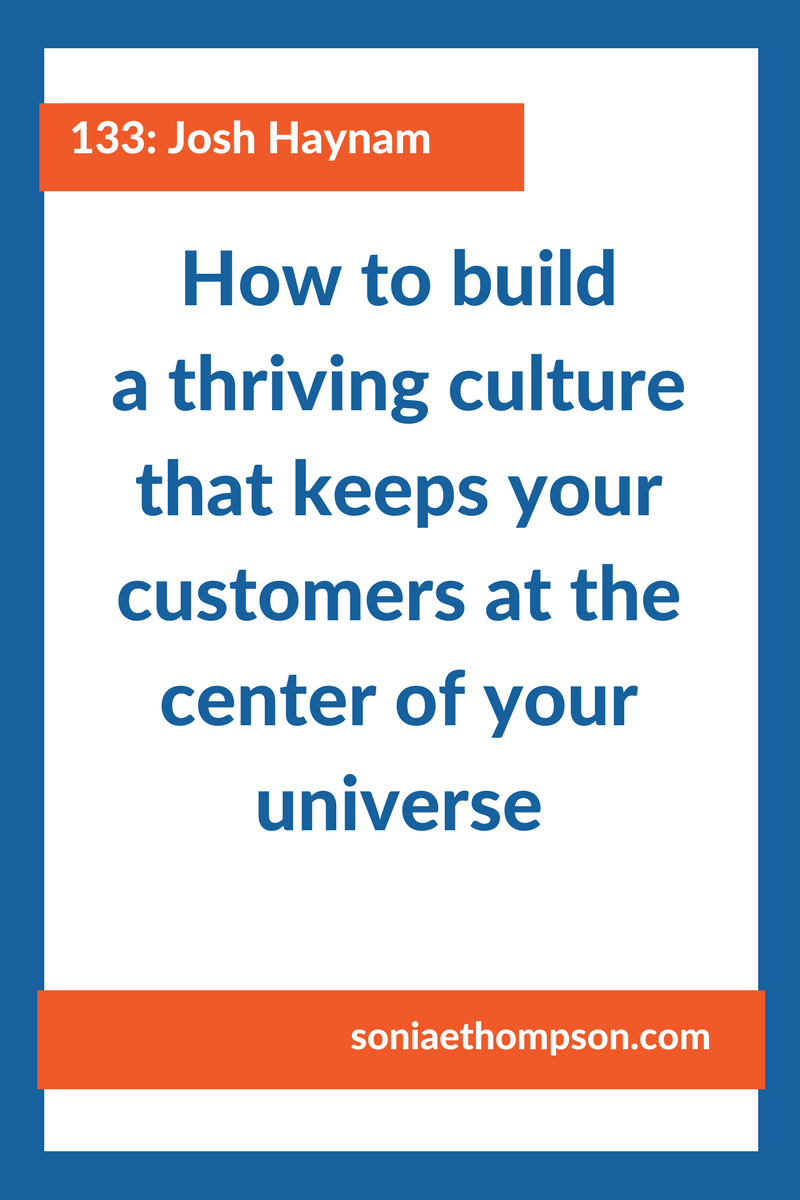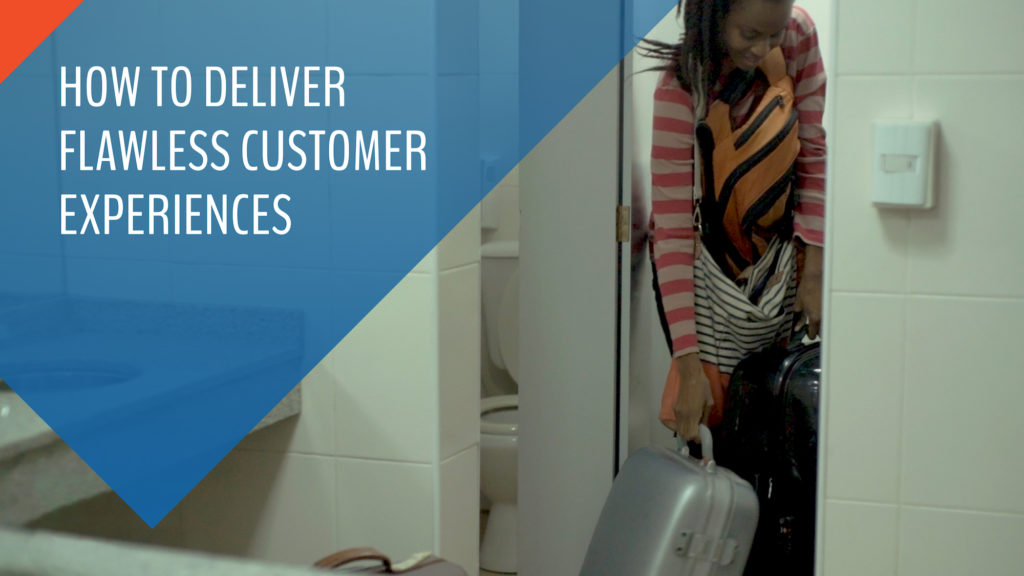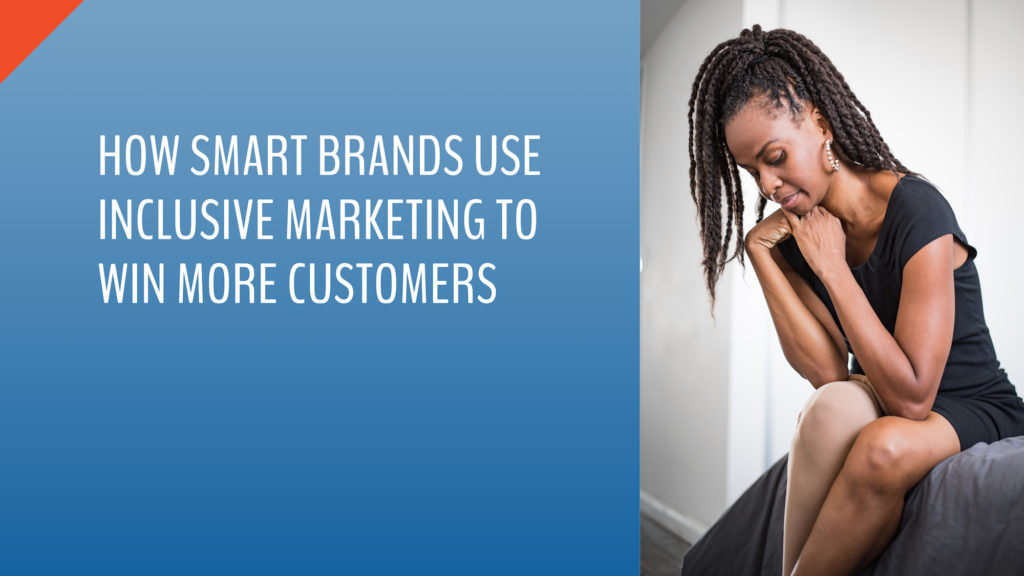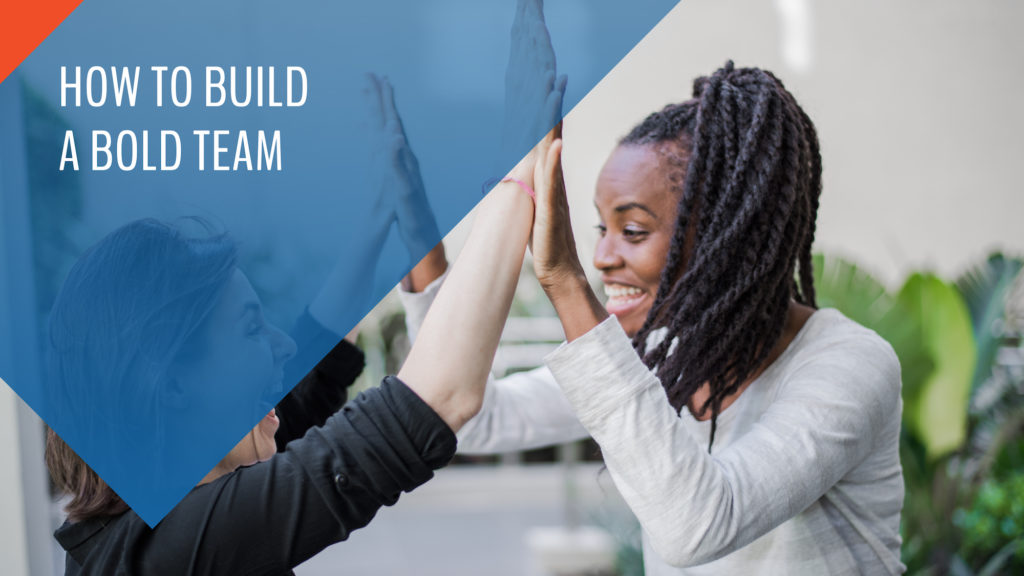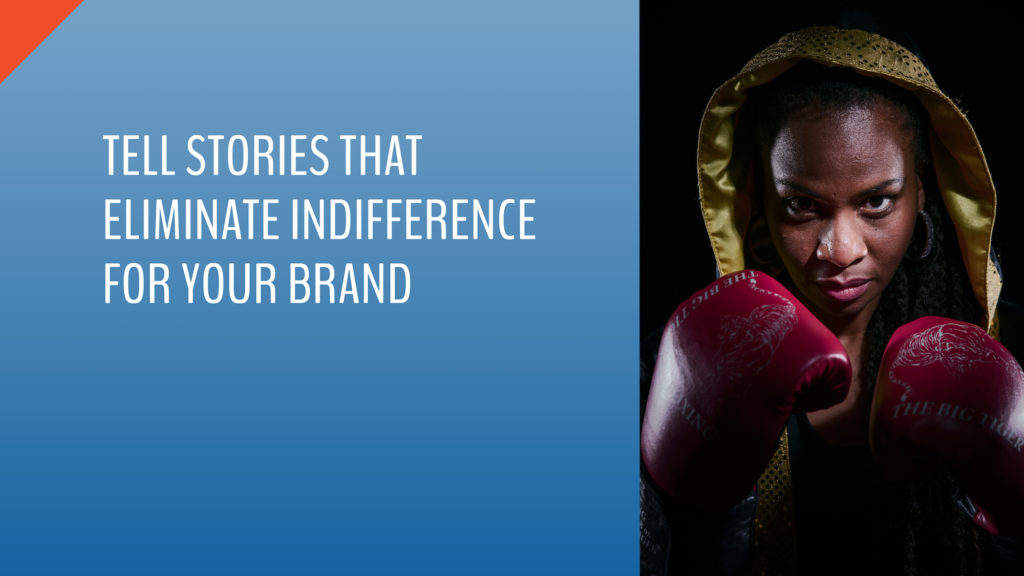Josh Haynam is the co-founder of Interact, a software tool that helps businesses generate leads and sales using quizzes. Interact serves customers in 192 countries around the world, which is quite impressive.
And even though they were first to market, they now have about 20 competitors, and yet they continue to innovate, serve, and grow.
Josh and I had a fascinating conversation about what he’s done to build a growing company that keeps the customer at the center of their universe.
Key points:
- Why entertaining your customers will help you sell more products
- Where breakthrough ideas come from
- A simple definition of what it means to deliver a remarkable customer experience
- How to build a culture of customer service on your team
- How to equip your team to manage diverse customers from all over the world
- Practical ways to maintain an intense customer focus as your business grows
- The 1 think you need to do when talking to a customer
Show notes:
- Interact quizzes
Listen to the 27-minute episode here:
Watch the episode here:
Read the discussion here:
Why quizzes are a smart way to deliver a remarkable customer experience
Sonia: Hey, Josh. Thank you so much for joining me today. How are you?
Josh: Doing really well. Thanks for having me today.
Sonia: All right. Well let’s go ahead and dive right in. Tell me about your business Interact.
Josh: Yeah so Interact is a tool for making quizzes. And when I say that, it’s probably what you think of, which is those quizzes you see on Facebook all the time. You can’t get rid of them, they’re all over your news feed and we built a tool for that a long time ago in the tech world. It was five years ago and now we have 40,000 companies that use it.
We have clients like the Red Cross and Forbes and the United Nations. And they basically build quizzes that they can put on their own social media to draw people into their world and to draw people into their businesses and things like that. And it’s just become a really big thing the last few years. And we were kind of ahead of the curve and that’s where we are now.
Sonia: That’s really cool. I think I heard some data couple of years ago where they said that quizzes were the number one thing. Like if you were asking somebody to do a quiz or complete a quiz, that was the number one way to get somebody to open your blog post or whatever. Things like that. So something so simple but works so well, right?
Josh: I know. It’s so silly sometimes. Even to me, I’m like man these numbers are crazy. Last year the quizzes built on Interact got taken a quarter of a billion times. So 250,000,000 times. And the average person spent two minutes taking those quizzes. So it’s 500,000,000 minutes. And it’s just crazy. And it’s just such a powerful thing that everybody is able to do now through the platform. And it’s really a viral component.
Sonia: Oh my goodness. All right, well tell me what is the specific problem that you saw for the people that you serve?
Josh: I think the real big problem is that with the world we have today, we’ve got social media and we’ve got all the news that we want at our fingertips. There’s information overload, there’s so many things that what ends up happening is we choose whatever is the most interesting or entertaining, not the thing that’s the most useful or valuable.
And as a brand, when you’re trying to do marketing, it’s really hard to stand out because we got so used to creating materials that were useful and valuable that could actually teach people something. But people are not so interested in that anymore. Now they’re more interested in whatever is happening on Facebook.
And so what we do is we found a way to merge those two worlds. So you make a quiz like, “What kind of coffee drink are you?” If you’re selling coffee and at the end of you, you tell people which kind of coffee drink they are and then you’re able to sell coffee beans or coffee drinks or whatever it is.
And that quiz is entertaining and it has a fighting chance against all the other stuff that’s on Facebook but at the end of the day you actually kind of informed people, based on the quiz, and you kind of give them more information. So you did give some value but it’s also entertaining. So we have solved the problem of brands needing to be entertaining but also sell their products.
Sonia: And it’s a great user experience because it’s fun. Everyone likes to be able to find out little things about themselves and share it with their friends. How did you actually come up with the idea for this?
A smart way to discover what your customers really want
Josh: Yeah, so we call it an accident on purpose. Which basically means that myself and Matt, who is the co-founder of the company, we were web consultants. So we were building people’s websites. Doing all their marketing, their email lists, and all that kind of stuff. And we’d spend all this time building websites and building pages and building all this cool stuff for them.
And at the end of the day all they would ever ask us about was how many new email subscribers they got, which was kind of frustrating because we did all this cool stuff and all this and all they want to know is how many subscribers they got.
So one time a client requested a quiz and we built it and it had an email capture form built into it and it converted enormously better than anything else we had ever done. And we paid attention to that and turned it into a platform. We didn’t know how to do it at the time but it took a while and we slowly built it up over a couple of years and then it became what it is today.
Sonia: Yeah I think most ideas and breakthrough ideas are not just something that somebody was sitting around thinking about. It was something that’s born out of conversation, paying attention to what was going on and really seizing an opportunity. And a lot of times, those conversations happen as a result of a customer interaction.
Josh: Yeah, I mean a lot of people ask me now how you come up with ideas? They talk to me about what I do and they’re like, “Oh I have this idea. I came up with it.” And I usually tell them there’s not much that’s gonna come out of that.
You really get the good ideas when you’re in an industry, when you’re understanding the problems and then something just rises to the surface as an obvious solution. And that’s where businesses come from. It’s not from somebody sitting in a dark room coming up with new ideas.
Sonia: Right. Now why do your customers choose you? Are you guys the only ones doing quizzes these days? Or they jumped on the bandwagon?
Josh: Yeah, there’s definitely some bandwagoners. When we started there was no one. And I made some calls to some very strategic marketing players that had been doing marketing technology for a long time and I asked them if there was anybody doing this. And there were some agencies that had kind of gotten into this space when we started, but there was no tools.
So when we started there was no one. Now there’s probably 20. And so there are a lot that have come up with similar solutions. But what we’ve always focused on is making the process as easy as possible and then also building in everything that we’ve learned along the way into our platform.
So not only is it easy to set up, but we’ve also got all this information that’s proprietary based on how much we’ve learned and how long we’ve been doing this that we’ve built into what we do.
What it means to deliver remarkable customer experiences
Sonia: What does a remarkable customer experience mean to you? Because it sounds like based upon what you just said in terms of you’ve taken all your learning and you’ve built it into the platform that helps your customers have a unique experience that they can’t get with any of the other quiz providers out there. So what does that mean to you and how does it show up in other ways in the products and services that you offer to your customers?
Josh: Yeah I mean I think the thing about a remarkable experience is when you do more than is expected. And there’s kind of a benchmark for what software companies do for their clients and we always try to go above that. And we’ve heard from a lot of our clients that we’ll reach out and just check in on how they’re doing and they’ll respond, “No one ever does that. That’s crazy, that’s awesome that you did that.”
And I think there’s the baseline that you have to do.
But then there is what can you do to be genuinely helpful, not just the minimum of answering questions that they have, but checking in to see how they’re doing, making sure they have the right materials, connecting them with people that might be able to help them with their content, that kind of stuff where we’re actually bringing everything together for them without them even having to ask for it. I think that’s really what it is. It’s when you get more than what you even thought you were going to.
How to build a company culture that is obsessed with serving your customers
Sonia: For sure. Now what kind of culture do you have to cultivate among your team? I know you mentioned your co-founder, is it just the two of you or do you have a bigger group of people?
Josh: We have seven now.
Sonia: You have seven. Whenever it’s beyond one person, it gets more complex the more people you have. Your business takes on a certain culture. Now to be able to exceed the industry standard to create that experience for your customers that makes them feel cared about, what is the culture that you have to cultivate among the seven people who are representing you and your brand to make sure that that is something that they do naturally as a part of their day to day?
Josh: Yeah, I think it starts with the people. And everyone that we bring in has their own brand, if you will, of excellence in customer service and their own way of connecting with people and just being a genuinely good human that is …
Sonia: It’s underrated, right?
Josh: Right. It doesn’t happen that much, especially in the world of technology. It’s crazy how terrible some of these companies are. And so it starts with that. And that’s really the biggest thing because at the end of the day people are going to be themselves after a while. They might be able to put on a face for a while but it’s not going to last. So it has to start with the individual, they have to genuinely care about others and want to make a better world for everyone else. So it starts there.
And then we have these unifying factors that bring us together. So we have a couple of really main values. The first one of which is show infinite kindness to everyone, which is really hard to do sometimes in customer service when you have somebody that’s irate about something for no reason. But you just kind of have this infinite kindness. And that is shared across the team. So if one person’s kind of at their wits end, someone else can jump in and spur that on and fix the situation and we have each other’s backs in that way.
And then the other value is to never stop innovating. So part of really good customer service is paying attention when people are having the same issues. The same thing keeps coming up. We need to fix that rather than just letting it continue to happen. So it’s not just the fact that we’re able to adapt to people that have issues, but also that we are fixing the product and actively working on the things that are frustrating.
Sonia: For sure. I love those values that you have. They are so simple but they are able to make a really significant difference in terms of how you’re able to show up and what you’re able to do for your customers. Now how do you work to make sure that your team, and it’s a small team so it’s probably a little bit easier for you, but how do you make sure that people keep those values in particular top of mind so that it’s not like, oh we’re about innovation but they’re actually innovating and they’re actually being kind on a regular basis?
Josh: Right. Yeah. I think that kind of goes back to communication. For things to really take effect in the long run, it’s not gonna happen overnight. It’s not just we have this meeting, we talk about this and all of a sudden we just keep doing it. That’s just not how things work. So you have to continually be investing in it. You have to continually be talking about it. And what can we improve and what was a challenging customer? Let’s talk about how we can handle that better, this kind of thing. So it’s an ongoing thing.
So that starts with having some structure. So we do have meetings that are scheduled daily, weekly, monthly to talk about stuff like that. It’s built into the way that we talk about building new product and the way that we talk about growing our customer base, all those kinds of things. It’s really weaved into everything. So it’s part of what we do but then there’s also these very particular times where we set aside time to talk about it and make sure that we are continuing to work on it.
How to build a company culture that is poised to engage and effectively serve diverse customers from around the world
Sonia:
Okay. Now how does diversity play into building a high performing team that enables you to solve your customer’s problem like none other? Diversity means a lot of things to a lot of people, a lot of different things. So for your business, what does it mean for you guys and how does it play out in what you’re able to produce?
Josh: Yeah, I mean I think there’s so many different definitions of diversity. And there’s different types of people, different ways of thinking about things. I guess I would define it as different backgrounds and different ways of thinking about things. And there’s always more of those than you can ever imagine. And we now, we work with customers in 192 countries …
Sonia: Oh my gosh, you’re in almost all of them, right?
Josh: Almost all the countries. And we have very different backgrounds, even amongst the seven people that are on our team. So there’s all these different things coming in. And I think that can be a negative or it can be a positive. And when it’s a positive is when everybody is very cognizant of paying attention to these different things that are coming in and you’re learning from them rather than being opposed to them.
And I think that is the key to all of it is that if you just have a truly open mind and truly wanting to learn from these different experiences that people will bring in, different viewpoints that people bring in, then it can be all very, very useful and you can make a better company overall.
Where it becomes an issue is when you have an abrasive attitude towards a different idea or a different thought process. That’s not helpful at all. All that causes is confusion and arguing. So it really comes down to being adaptable and actually listening.
Sonia: For sure. Now I’m super curious, what would you say is the biggest aha moment that you had once you started … From working with customers in all these different countries. There’s so many differences it’s hard to even fathom what they are. So what was the biggest aha moment that you had that you feel like caused the biggest change in your approach to make you adaptable to be able to work with all of these different diverse customer groups?
Josh: Yeah I think it was the way that I would define it is that when you build something you forget how it was built, which is ironic. Because once you get to a point where it becomes a bigger thing, you forget what it was like when you were just getting started.
And then you have all these people coming in, tens of thousands of them from all over the world, asking all these questions and it can be very frustrating because you get it, you’ve been working on it for a long time, everything makes total sense to you. But then there is all this stuff that’s confusing and overwhelming. And I think the biggest aha moment in that was just taking a step back.
And I actually was working on using a different product, not ours, for the first time. And I was getting super frustrated. And I sat back and I was like, “Wait, this is what it feels like.” And from that point forward, we stopped thinking about things from our perspective and started trying to see things from someone else’s perspective for the first time.
From a different country or wherever, not knowing how to use this. And it’s totally changed everything. So everything we’ve built since then is much more simple, easy to use. It’s got explanations built into it, there’s materials, there’s offers to do calls, all this kind of stuff.
So it really was a groundbreaking thing to just see it from an outside perspective.
Sonia: For sure. Empathy. Empathy is what you’re talking about, right?
Josh: Exactly. That’s it.
Sonia: But you know, it’s such a simple concept that you said was game-changing in terms of what it allowed you to do for your customers and produce for them. But yeah, just simply putting yourself in their shoes. Just a simple concept but makes such a major impact.
Josh: Yeah. It’s so funny how that stuff is so obvious once it happens. But before it’s like everything is so frustrating and so confusing. And then it just falls into place and you’re like, “Oh well duh.” And that’s kind of how that one felt.
How to deliver product solutions that satisfy your customers’ pain points
Sonia: Got it. Now do you guys, I know with your team, do you guys start keeping a running tally of documenting all these new things, experiences, as you’re communicating with your customers on a regular basis, as you’re taking the time to take things and evaluate their experience from their point of view? How do you then translate that into product? Because I think sometimes businesses will have these interactions with their customers and they’ll get it and they’ll internalize it in their head, but to actually make it something that, “Oh yeah, I got it, I got it, I got it.” To actually something that shows up in the product or the experience, two completely different things. So what do you do to build the bridge so that the insight actually turns into something that is able to enhance the experience for the customer?
Josh: Yeah, that’s a really good question. And the way that we do it is we try to track as much as we can. So when somebody asks a question, we document that. When somebody is confused on something, we document that. We’ve got all these documents either using Twilio or Google Docs, something like that where we’re tracking how many times a certain issue is arising.
And then there’s kind of this translation from that question and where the confusion lies into an actual product solution. And one thing I feel like I’ve learned over the years is that a customer can’t tell you what it needs to look like or how the thing needs to function, they can only tell you where their confusion lies.
And so I think there is somewhat of a secret sauce in understanding how to take a request and turn it into a product and the way that we track whether it worked is we look at how many times does that same question come in after we implement our solution? So there is some guess and check to it where you have to translate this request into a product and then go back and see if those requests keep coming in. But the way we do it is very structured in when something comes in we make sure we write it down, we keep a tally of how many times that same question has come in and then we work on solutions to the top, most requested things.
Sonia:
Very good. Very good. This is fascinating. I love it. Now you mentioned you were first to market. Now there’s like 20 other players. So what would you say has been your biggest leadership challenge in maintaining that advantage and continuing to innovate so that even if all these other people continue into the market, your customers, your ideal ones, continue to choose you? So that you can get to all of the countries in the world not just 192.
Josh: There’s a few left. Yeah I think that the biggest challenge is that there’s always this tendency to go back to wanting to invent from the start again. So when you start, no one’s using your product. When we started no one was even asking for it so we just kind of built it. And so you’re building it on your own. You’re using your inventiveness to create this new thing in a box, basically. You’re not talking to that many people. As you start to grow and you’re getting thousands of customers, tens of thousands of customers, the only way you’re gonna stay on top is by talking to those people about what you should do next.
And there’s always this tendency that we have on our team as inventors, as builders to want to just build things on our own and it never works. Because there’s an idea that we have but it’s not what everyone else wants. And we are working for the customers. So the biggest challenge is just making sure that every single thing we do is customer driven, especially on the product side.
How to maintain a customer-focused company culture as your business grows
Sonia: Got it. Now do you find that that is becoming a more … Is that intense focused customer obsession for you, is that becoming harder to maintain as your company gets a little bit bigger? You know because I imagine there’s managerial things that you have to work on. So how do you maintain that same sense of urgency and focus on the customer at all levels, no matter what size you are?
Josh: Yeah, I think for me it scales down a little bit. I don’t have as many calls with customers as I used to but now we have a few girls on our team that are on calls all day. And that’s where we’re still getting all that feedback from. They’ll do 10 calls a day five days a week. And those are just straight customer interactions. Oftentimes half an hour, 45 minutes. And so we’re constantly getting feedback.
So that’s more than I was ever able to do on my own because there’s two of them. So all that stuff is coming in all the time and we’re never going to stop doing that. As we grow we’ll just add more people that are talking to people all day. Because that’s the way that we continue to innovate, is just by hearing what’s going on and then building something that solves problems.
Sonia: Very good, Josh. This has been super cool. Thank you so much for stopping by. Any parting words of wisdom for businesses who are working hard to create remarkable customer experiences for the people they’re serving?
Josh: I think the one thing is to drop your ego when you’re talking to a customer. It can be really tough when it’s something you’ve built and now they’re ripping it apart and they’re having trouble with it. But just let go of all that and listen. And you’ll learn so much when you try to actually solve the issues that people are having and you’ll get so much further than if you feel like you can do it on your own.
Sonia:
All right. Great advice. All right well before I let you go, one other bonus question for you just to dive inside your head a little bit more. And that’s deliver a line from a movie that speaks to you and explain why you chose that one. These movie lines, sometimes they reveal so much about people that they don’t necessarily think, in terms of their philosophy sometimes and how you run a business. And sometimes it’s just like, hey, it gets people to understand you a little bit better.
Josh:
Yeah, definitely. I’m definitely going to butcher it but it’s from the movie Gladiator. You’ve got to put it in context. So the guy in Gladiator gets ripped away from his home by the enemies and he ends up being forced into being a gladiator and then he rises to the top. And at the very end he ends up killing the leader that had killed his family in the first place.
And he’s standing in front of this giant crowd and he says something like, my name is Marcus Aurelius, I’m from this place and I’ve led all these legions and I’m standing before you as a family man, essentially. And so his identity is not rooted in all these things that he’s done. He was successful once, it was all ripped away, he’s successful again and none of that mattered to him. What mattered to him was where he was from and his core values. And I think that’s incredible because that’s how I would love to be seen. It doesn’t matter what you’ve done, what matters is who you are and what your core values are.
Sonia: Got it. And it makes perfect sense because the core values are such an integral part of your business and what you’re operating and doing. I love how it connects.
Josh: Yeah, it does. It’s good.
Sonia: Again, thank you so much. This has been a lot of fun.
Josh:Thank you.
Free Mini-Course: The Customer Magnet Playbook
Free Mini-Course: The Customer Magnet Playbook
7 Essential elements your business needs to consistently win more customers
- Framework based upon in the trenches experiences from 150+ business and thought leaders
- Science-based explanations to support why the elements of the blueprint work
- Action items to help you get some quick wins
